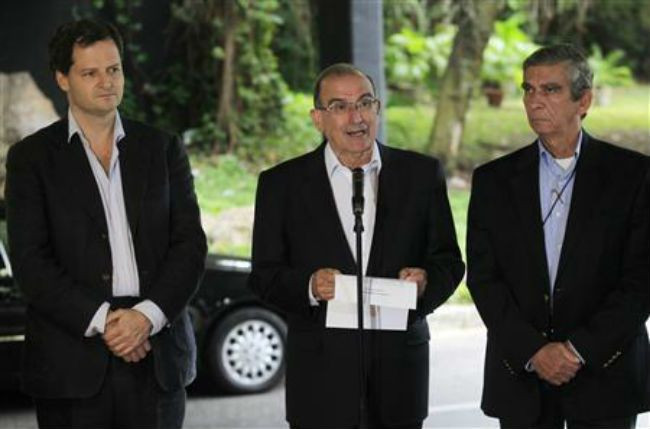
Colombia's Marxist-led FARC rebels said their peace talks with the government were going well, but the lead negotiator for President Juan Manuel Santos was more reserved as the two sides finished the first round of meetings aimed at ending their protracted conflict.
In separate sessions with the press, neither side spoke of breakthroughs in the talks, but nor was there any sign they had hit irresolvable obstacles as happened in previous peace attempts. They will reconvene in Havana on Wednesday.
The country's bloody guerrilla war, in which tens of thousands of people have died, dates back to 1964 when the FARC, or Revolutionary Armed Forces of Colombia, formed as a communist agrarian movement. It turned later to the illicit drug trade, kidnappings and extortion to sustain itself.
Millions of people have been displaced by the war, which the FARC says is a fight to end Colombia's long history of social inequality.
Dutch national Tanja Nijmeijer, a FARC negotiator, told reporters the talks "are going very well," with occasional moments of levity.
"The atmosphere during the talks is very good. There's even space for little jokes, for laughing," she said in response to a question.
Senior FARC leader Andres Paris said the negotiators mingled in the hallways during breaks and were getting to know each other.
"One doesn't know who is more surprised, them or us," said the mustachioed guerrilla. "When we sit at the table, they can observe not barbarians, not savages, but fighters, intellectuals, politicians, the sensible men and women."
Lead government negotiator Humberto de la Calle, who read a statement and took no questions, gave a more muted assessment, but indicated progress.
'MORE THAN SPEECHES'
"We have finished the first round of direct conversations. I can say ... we have advanced as expected," said de la Calle, wearing a black suit and white shirt, but no tie.
"We will not move conversations at the table to the microphones. More than speeches, we want concrete results," he said. "When there is relevant information, we will make it public in an opportune manner."
His comments were the first by the government negotiating team since the talks began on November 19, while the FARC members have spoken daily going into the meetings.
So far, they have held to an agreement not to discuss what is being said at the negotiating table. One of their topics has been Simon Trinidad, a former rebel leader they want released from a 60-year prison sentence in the United States so he can participate in the talks.
A photo of Trinidad, who is imprisoned for the kidnapping of three Americans in Colombia, loomed behind the rebels at their news conference.
Nijmeijer, who wore black clothes and a checked Palestinian scarf slung around her neck, read a FARC declaration of solidarity with the Palestinian people before going into Thursday's talks.
Previous attempts at peace ended in shambles, but a 10-year-long, U.S.-backed military offensive has weakened the FARC to the point the government believes the group may be ready for a negotiated end to the war.
The talks have begun with the complicated issue of rural development. Four equally thorny topics - ending the war, the political and legal future of the rebels, the drug trade and compensation for war victims - will follow.
Both sides said they wanted full citizen participation in the peace process, which Santos hopes to conclude in nine months.
They have opened an Internet site, www.mesadeconversaciones.com.co, for citizen input and will hold citizen forums.
© Thomson Reuters.




